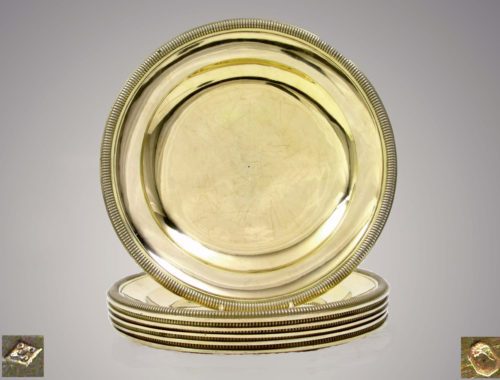Object Number: #402
City’s Hallmark: legal standard mark for Paris 1809-19 „1r titre 950 o/oo“ (s. Rosenberg 1928, No. 6573, 6666).
Maker’s mark: „JBCO“ for Jean Baptiste Claude Odiot (s. Rosenberg 1928, No. 6768 and Nocq 1968).
Additionally marked „ODIOT“
Diameter: 27,5 cm; Weight altogether: 5.520 gr.
Detailed Information
A Set of Six French Silver Gilt Dinner Plates
The present six silver-gilt dinner plates signed by Jean Baptiste Claude Odiot were made in Paris in the early nineteenth century. The round plates are solidly worked and the only decoration they have is a laid-on gadroon on the profiled wide edge. The mirror is strongly recessed and without any ornamentation.
Master
Jean Baptiste Claude Odiot was born in 1763 and became master maker around 1785. Shortly after 1823 he withdrew from business and donated the great series of his bronze models to the state (now in the musée des arts décoratifs, Paris). In 1827 he handed the business over to his son Charles.
Jean Baptiste Claude Odiot and Martin Guillaume Biennais were the preferred goldsmiths of Napoleon I and the Imperial family. While J.B.C. Odiot was famous for his large, sculpturally designed objects, as well as his descent from an old goldsmiths’ family, Biennais had originally completed a carpentry apprenticeship. Odiot was active for Napoleon I, as well as for the Russian and Austrian courts and also for prominent English military. Together with Biennais he produced the large table service for King Max I. Joseph of Bavaria, which is now in the collection of the Munich Residency.
Provenance: European Collection
Literature
Henry Nocq: Le poinçon de Paris. Répertoire des maîtres-orfèvres de la juridiction de Paris depuis le Moyen-Age jusqu’à la fin du XVIIIe siècle, Vol. III. Paris 1968
Marc Rosenberg: Der Goldschmiede Merkzeichen. 3rd Ed. Vol. IV, Ausland und Byzanz. Berlin 1928.



